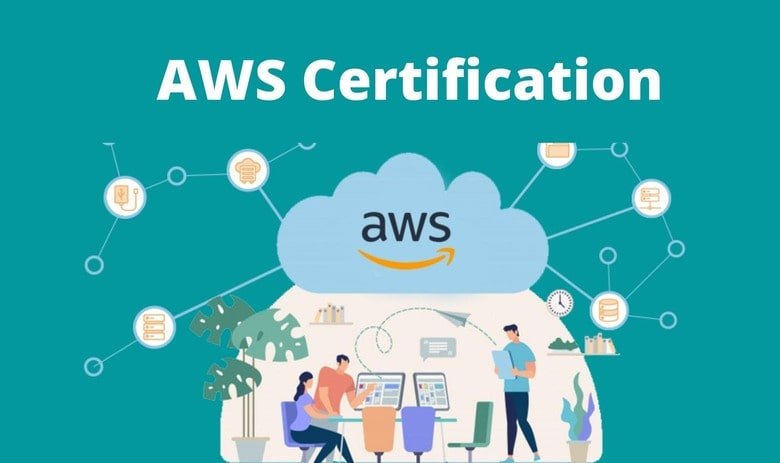AWS Certification: Your Ticket to a Successful Career in Cloud Computing

It would not be an understatement to claim that “the cloud” is the center of our digital universe. Truth be told, we are surrounded by clouds, just like the air we breathe. Whether we like to admit it or not, the cloud governs all aspects of our personal and professional life. Without interacting with the cloud, we are unable to access anything online. The cloud is controlling every aspect of our lives, from social media to streaming services, online shopping to tracking our every step, and data storage to maintaining backup files for protection. And what better way to launch a successful career in cloud computing than by earning an AWS certification, which can lead to lucrative career opportunities such as cloud architect, devOps engineer, cloud engineer, solution architect, and many more, as well as a handsome salary package, the opportunity to work with big names in the tech industry, and opportunities to climb up the organizational hierarchy.
If you are interested in gaining access to the realm of the cloud computing industry or upskilling yourself to take your career trajectory to the next level, then you would have a better chance of success by developing the all-important cloud skills and earning the right AWS certifications because almost all businesses are looking for cloud professionals with expertise in AWS.
But what exactly is AWS? Where do you begin on the AWS certification path, and which learning path is right for you? Read on to find the answers, as this article will elaborate on how earning the right AWS credential to your name can help redefine your career graphics and give the bolster that it needs.
Amazon Web Services
The most popular cloud platform globally is called Amazon Web Services, or AWS. With more than a decade of experience, it provides a wide range of services that may be customized to fit numerous use cases. AWS presently dominates the global market for public clouds and is at the top of its game. When it began operating in 2006, it was the first company to offer infrastructure services through the Internet. Having said that, Amazon offers the advantage of utilizing the most cutting-edge technologies in terms of functionality and support.
Additionally, it offers a variety of services, including computing, storage, security, migration, databases, analytical, and management services in addition to the Internet of things (IoT), artificial intelligence, and machine learning, making it the cloud computing platform with the fastest growing user base. All of the largest global corporations, like Netflix, Meta, LinkedIn, Facebook, Zoopla, Pinterest, and many more, make use of its cloud services and applications in their businesses.
What is the importance of AWS certification?
- AWS verification is a widely accepted certification that verifies your proficiency with the Amazon cloud computing platform and your knowledge of the cloud.
- An AWS certification helps employers recognize your proficiency in the full cloud lexicon and your possession of the requisite cloud skills to lead initiatives using AWS services. It also acts as a testament to your tenacity, integrity, and aptitude as a cloud professional.
- They serve as evidence for recruiters, emphasizing your rigorous training to achieve AWS proficiency.
But keep in mind that these are not the ultimate objective. These are merely instruments that can assist you in successfully achieving your ultimate goal; they are not golden tickets that can ensure a certain spot or advancement in a company. They do, however, give you a leg up by making you stand out among your peers and hold the key to opening doors to a number of chances for you to increase your expertise and experience.
How to learn AWS?
Now that we’ve established what AWS entails and the benefits it provides for a successful cloud journey, let’s go over which AWS certification you should pursue, as well as the preparation and training you’ll need to complete.
Learn AWS by role or solution
When learning AWS, it is critical to select the certification that corresponds to the career path that you wish to pursue. As a result, AWS training could be based on the following:
A role such as Solutions Architect, cloud practitioner, operations, and developer.
A solution such as Advanced networking, data analytics, machine learning, and security.
Available AWS certifications
Amazon Web Services offers 11 certifications divided into four categories: Foundational, Associate, Professional, and Specialty. It can be intimidating at first to determine which certification to pursue and what preparation is required to earn the credential. However, once you’ve decided on a career goal or job role, the certification path will become much easier.
Let’s take a look at what each certification group entails so you can get a sense of what might be the best option for you and where you should start.
1. Foundational Certifications
AWS offers foundational certification for those who are new to the cloud or come from a non-IT background. AWS currently offers only one foundational certification, AWS Certified Cloud Practitioner, which is suitable for beginners and can assist you in learning the fundamental AWS cloud concepts and services. If you are just starting out, the Cloud Practitioner certification exam is the shortest and cheapest, and it could be your starting point in your certification path.
2. Associate Certifications
Associate-level certifications are intended for those who have some prior cloud or on-premises experience. In this group, there are three certifications covering a knowledge base across a wide range of AWS services and offering advanced knowledge in the day-to-day implementation of AWS services.
- AWS Certified Developer – Associate
- AWS Certified Solutions Architect – Associate
- AWS Certified SysOps Administrator – Associate
AWS Certified Solutions Architect – Associate and AWS Certified Developer – Associate are cited as two of the most certification in-demand AWS certifications. This is pursued by professionals who want to gain proficiency in developing, deploying, and debugging cloud-based applications using AWS and writing code for serverless applications.
3. Professional Certifications
Amazon advises anyone with at least two years of prior AWS cloud experience to pursue these certifications. There are two certifications that give an in-depth understanding of Amazon services:
- AWS Certified Solutions Architect – Professional
- AWS Certified DevOps Engineer – Professional
4. Specialty Certifications
Specialty certifications are aimed at people who want to demonstrate their competency in a particular skill set. To obtain these certificates, it is strongly advised that you have at least 2 years of experience using the AWS cloud and several years of expertise in a related sector.
The following are the certifications in this group:
- AWS Certified Advanced Networking – Specialty
- AWS Certified Security – Specialty
- AWS Certified: SAP on AWS – Specialty
- AWS Certified Database – Specialty
- AWS Certified Data Analytics – Specialty
- AWS Certified Machine Learning – Specialty
Preparation for AWS certification
The wealth of excellent materials, including books, AWS exam guides, AWS practice exams, and AWS communities, that are accessible to you online will make it much simpler for you to prepare for the certification. This is due to the fact that AWS is the most popular cloud platform. Also, there are numerous digital and conventional training methods that can direct you in studying cloud ideas from a basic understanding to advanced knowledge while also offering hands-on practical knowledge. For instance, Simplilearn’s AWS Solutions Architect Certification Training Course can assist you in your certification path and increase your employability to help open doors to a number of new prospects.






